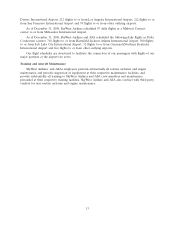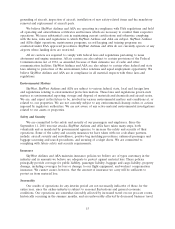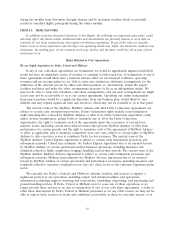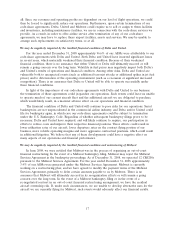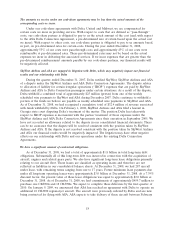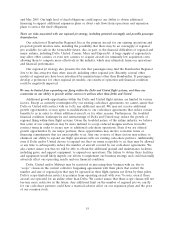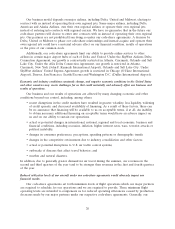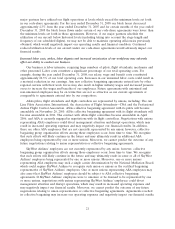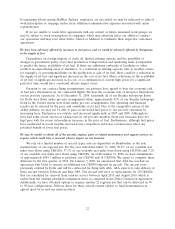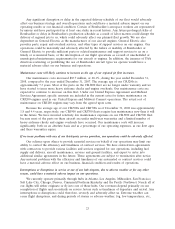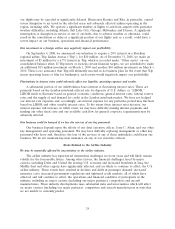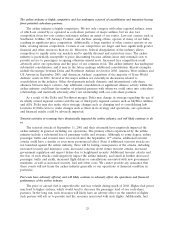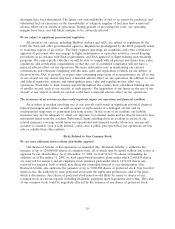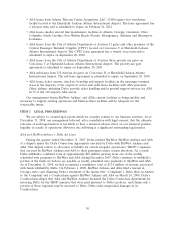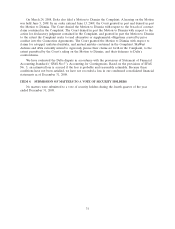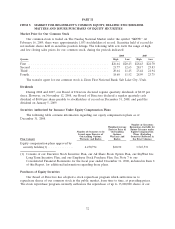SkyWest Airlines 2008 Annual Report Download - page 26
Download and view the complete annual report
Please find page 26 of the 2008 SkyWest Airlines annual report below. You can navigate through the pages in the report by either clicking on the pages listed below, or by using the keyword search tool below to find specific information within the annual report.If unionizing efforts among SkyWest Airlines’ employees are successful, we may be subjected to risks of
work interruption or stoppage and/or incur additional administrative expenses associated with union
representation.
If we are unable to reach labor agreements with any current or future unionized work groups, we
may be subject to work interruptions or stoppages, which may adversely affect our ability to conduct
our operations and may even allow Delta, United or Midwest to terminate their respective code-share
agreement.
We have been adversely affected by increases in fuel prices, and we would be adversely affected by disruptions
in the supply of fuel.
Dependence on foreign imports of crude oil, limited refining capacity and the possibility of
changes in government policy on jet fuel production, transportation and marketing make it impossible
to predict the future availability of jet fuel. If there are additional outbreaks of hostilities or other
conflicts in oil-producing areas or elsewhere, or a reduction in refining capacity (due to weather events,
for example), or governmental limits on the production or sale of jet fuel, there could be a reduction in
the supply of jet fuel and significant increases in the cost of jet fuel. Major reductions in the availability
of jet fuel or significant increases in its cost, or a continuation of current high prices for a significant
period of time, would have a material adverse impact on us.
Pursuant to our contract flying arrangements, our partners have agreed to bear the economic risk
of fuel price fluctuations on our contracted flights. We bear the economic risk of fuel price fluctuations
on our pro-rate operations. As of December 31, 2008, essentially all of our Brasilia turboprops flown
for Delta were flown under pro-rate arrangements while, approximately 42% of our Brasilia turboprops
flown in the United system were flown under pro-rate arrangements. Our operating and financial
results can be affected by the price and availability of jet fuel. Due to the competitive nature of the
airline industry, we may not be able to pass on increased fuel prices to our pro-rate customers by
increasing fares. Fuel prices are volatile, and increased significantly in 2007 and 2008. Although we
have had some recent success in raising fares in our pro-rate markets, these fare increases have not
kept pace with the recent extraordinary increases in the price of fuel. Furthermore, although fuel prices
have moderated in recent months, increased fare competition and lower revenues may offset any
potential benefit of lower fuel prices.
We may be unable to obtain all of the aircraft, engines, parts or related maintenance and support services we
require, which could have a material adverse impact on our business.
We rely on a limited number of aircraft types, and are dependent on Bombardier as the sole
manufacturer of our regional jets. For the year ended December 31, 2008, 50.5% of our available seat
miles were flown using CRJ200s, 37.5% of our available seat miles were flown using CRJ700s and 7.2%
of our available seat miles were flown using CRJ900s. As of December 31, 2008, we had commitments
of approximately $459.7 million to purchase one CRJ900 and 18 CRJ700s. We expect to complete these
deliveries by the first quarter of 2010. On January 9, 2009, we announced that ASA has reached an
agreement with Delta to operate an additional ten CRJ900 regional jet aircraft. The aircraft were
previously ordered by Delta and will be contracted for flying with ASA. ASA expects to take delivery of
these aircraft between February and May 2009. The aircraft will serve as replacements for 20 CRJ200s
that are scheduled for removal from contract service between April 2010 and August 2010, which is
earlier than the existing scheduled termination dates as contained in the Delta Connection Agreement.
Additionally, we have obtained options to acquire another 22 regional jets that can be delivered in 70
to 90-seat configurations. Delivery dates for these aircraft remain subject to final determination as
agreed upon by us and our major partners.
22



